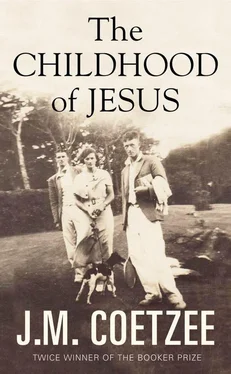‘Because it is not enough to sit around waiting for destiny to act, Elena, just as it is not enough to have an idea and then sit back waiting for it to materialize. Someone has to bring the idea into the world. Someone has to act on behalf of destiny.’
‘That is just what I said. You arrive with some private idea of what a mother is, which you then project onto this woman.’
‘This is no longer a reasonable discussion, Elena. It is just animosity I hear, animosity and prejudice and jealousy.’
‘It is neither animosity nor prejudice, and to call it jealousy is even more absurd. I am trying to help you understand where this sacred intuition of yours comes from, which you trust above the evidence of your senses. It comes from inside you. It has its origin in a past that you have forgotten. It has nothing to do with the boy or his welfare. If you had any interest in the boy’s welfare you would reclaim him right away. This woman is bad for him. He is going backwards under her care. She is turning him into a baby.
‘You could get him back today if you wanted to. You could simply walk in and take him away. She has no legal right over him. She is a complete stranger. You could reclaim your child, you could reclaim your apartment, and the woman could go back to La Residencia, where she belongs — to her brothers and her tennis games. Why don’t you do it? Or are you too frightened — frightened of her brothers, frightened of the dog?’
‘Elena, stop. Please stop. Yes, I am intimidated by her brothers. Yes, I am nervous of her dog. But that is not why I refuse to steal the child back. I refuse, that is all. What do you think I am doing in this country where I know no one, where I cannot express my heart’s feelings because all human relations have to be conducted in beginner’s Spanish? Did I come here to lug heavy bags, day in, and day out, like a beast of burden? No, I came to bring the child to his mother, and that is done now.’
Elena laughs. ‘Your Spanish improves when you lose your temper. Maybe you should lose your temper more often. About Inés let us agree to disagree. As for the rest, the truth is we are not here, you and I, to live happy and fulfilled lives. We are here for the sake of our children. We may not feel at home in Spanish, but David and Fidel will. It will be their mother tongue. They will speak it like natives, from the heart. And don’t sneer at the work you do at the docks. You arrived in this country naked, with nothing to offer but the labour of your hands. You could have been turned away, but you were not: you were made welcome. You could have been abandoned under the stars, but you were not: you were given a roof over your head. You have a great deal to be thankful for.’
He is silent. At last he speaks. ‘Is that the end of the sermon?’
‘Yes.’
Four o’clock, and the last sacks from the freighter at Wharf Two are being stacked on the dray. El Rey and her companion stand in harness, placidly chomping at their feed-bags.
Álvaro stretches his arms and gives him a smile. ‘Another job done,’ he says. ‘Makes you feel good, doesn’t it?’
‘I suppose so. But I can’t help asking myself why the city needs so much grain, week after week.’
‘It’s food. We can’t do without food. And it’s not just for Novilla. It’s for the hinterland too. That’s what it means to be a port: you have a hinterland to serve.’
‘Still, what is it all for, in the end? The ships bring the grain from across the seas and we haul it off the ships and someone else mills it and bakes it, and eventually it gets eaten and turned into — what shall I call it? — waste, and the waste flows back into the sea. What is there to feel good about in that? How does it fit into a larger picture? I don’t see any larger picture, any loftier design. It’s just consumption.’
‘You are in a bad mood today! Surely one doesn’t need a lofty design to justify being part of life. Life is good in itself; helping food to flow so that your fellows can live is doubly good. How can you dispute that? Anyway, what do you have against bread? Remember what the poet said: bread is the way that the sun enters our bodies.’
‘I don’t want to argue, Álvaro, but objectively speaking all that I do, all that we dockers do, is move stuff from point A to point B, one bag after another, day after day. If all our sweat were for the sake of some higher cause, it would be a different matter. But eating in order to live and living in order to eat — that is the way of the bacterium, not the. .’
‘Not the what?’
‘Not the human being. Not the pinnacle of creation.’
Usually it is the lunchtime breaks that are given over to philosophical disputation — Do we die or are we endlessly reincarnated? Do the farther planets rotate around the sun or around one another reciprocally? Is this the best of all possible worlds? — but today, instead of making their way home, several of the stevedores drift over to listen to the debate. To them Álvaro now turns. ‘What do you say, comrades? Do we need a grand plan, as our friend demands, or is it good enough for us to be doing our job and doing it well?’
There is silence. From the first the men have treated him, Simón, with respect. To some of them he is old enough to be their father. But they respect their foreman too, even revere him. Clearly they do not want to take sides.
‘If you don’t like the work we do, if you don’t think it is good,’ says one of them — in fact Eugenio — ‘what work would you like to do instead? Would you like to work in an office? Do you think office work is a better kind of work for a man to do? Or factory work perhaps?’
‘No,’ he replies. ‘Emphatically not. Please don’t misunderstand me. In itself this is good work we do here, honest work. But that is not what Álvaro and I were discussing. We were discussing the goal of our labours, the ultimate goal. I would not dream of disparaging the work we do. On the contrary, it means a great deal to me. In fact’ — he is losing the thread but that does not matter — ‘there is nowhere I would rather be than here, working side by side with you. In the time I have spent here I have experienced nothing but comradely support and comradely love. It has brightened my days. It has made it possible —’
Impatiently Eugenio interrupts him: ‘Then surely you have answered your own question. Imagine having no work. Imagine having to spend your days sitting on a public bench with nothing to do, waiting for the hours to pass, with no comrades around you to share a joke with, no comradely goodwill to support you. Without labour, and the sharing of labour, comradeship is not possible, it is no longer substantial.’ He turns and glances around. ‘Is that not so, comrades?’
There is a murmur of agreement.
‘But what of football?’ he responds, trying another tack, though with no confidence. ‘Surely we would love each other and support each other just as well if we all belonged to a football team, playing together, winning together, losing together. If comradely love is the ultimate good, why do we need to move these heavy bags of grain, why not just kick a football?’
‘Because by football alone you cannot live,’ says Álvaro. ‘In order to play football you must be alive; and to be alive you must eat. Through our labour here we enable people to live.’ He shakes his head. ‘The more I think about it, the more I am convinced that labour cannot be compared to football, that the two belong to different philosophical realms. I cannot see, I truly cannot see, why you should want to disparage our labour in this way.’
All eyes are turned on him. There is a grave silence.
‘Believe me, I do not mean to disparage our labour. To prove my sincerity, I will come to work an hour early tomorrow morning, and cut short my lunch break too. I will move as many bags per day as any man here. But I will continue to ask: Why are we doing this? What is it for?’
Читать дальше












